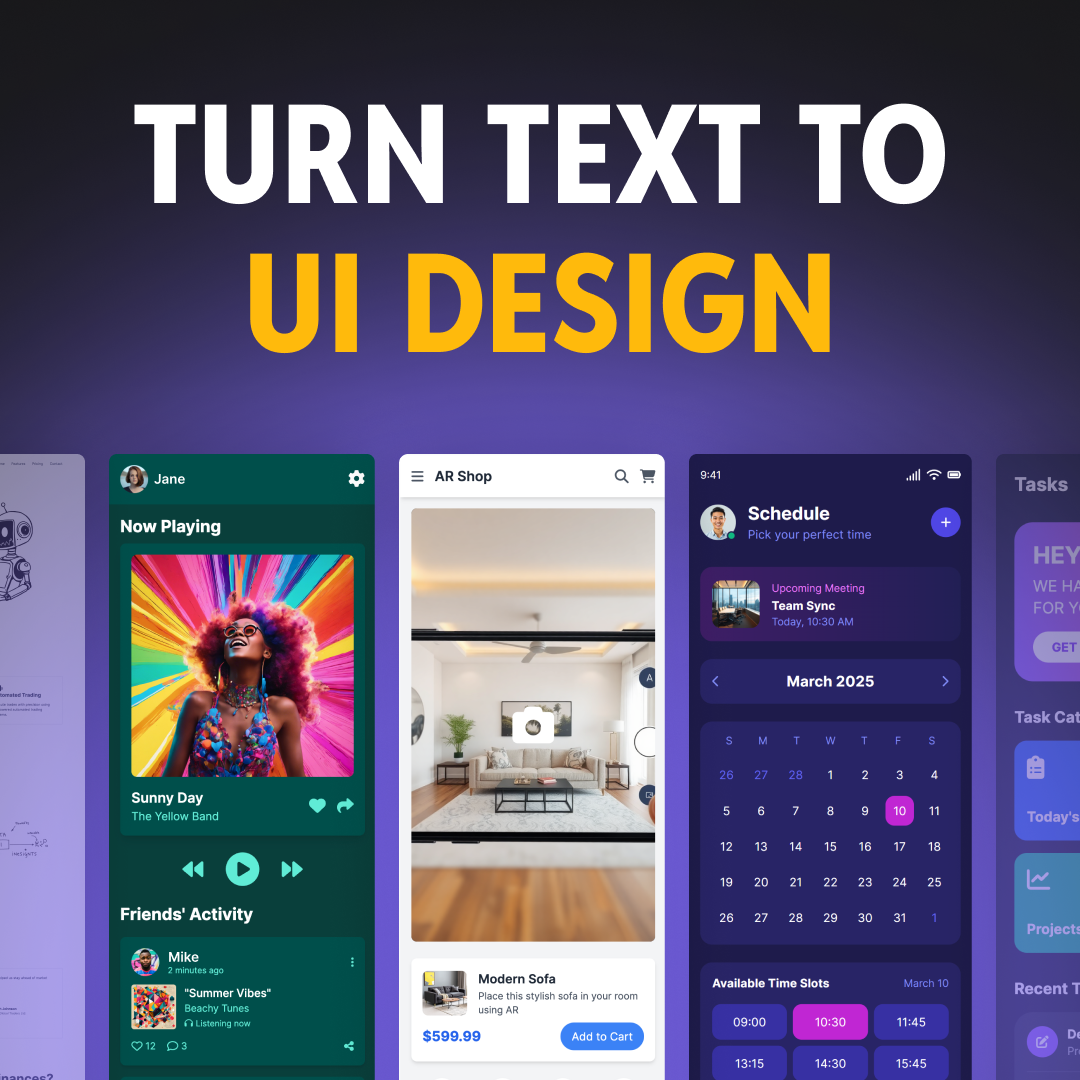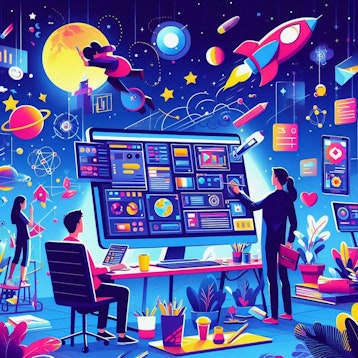Once upon a time, in a world rapidly transforming through technology, AI emerged as a pivotal force in design. This story begins with the dawn of AI, a revolutionary chapter in the annals of design history. As we traverse this narrative, we witness how AI startups are not merely participants but catalysts in the evolution of UX design.
These trailblazers, armed with innovative algorithms and visionary ideas, are reshaping the landscape, turning what once seemed like sci-fi fantasies into tangible, impactful realities in the realm of user experience design.

The Ultimate Guide for UX Designers
The only ebook you'll ever need to master AI for UX design.
Get 30% Off TodayThe Emergence of AI in Design
In the grand tapestry of design: From automating mundane tasks to unlocking new realms of creativity, AI's influence spans the spectrum. As we delve deeper into this world, we find AI startups standing at the vanguard, their groundbreaking tools and solutions heralding a new era in design. Ladies and gentlemen, here are the top 10 AI design startups you should key on your radar.
1. Adam Fard Studios (New York):
In the dynamic realm of generative AI startups, Adam Fard Studios emerges as a beacon of ambition and innovation. Currently in the throes of raising seed funds, this startup has captured the attention of numerous angel investors, drawn to its visionary approach and promising prospects. At the heart of its offerings is UXPilot, an AI-UX assistant that exemplifies the studio's commitment to revolutionizing the design process.
UXPilot is not just a product; it's a bold statement in the world of UX design. Developed for designers by designers, it encapsulates years of expertise gained from working with global brands. This comprehensive tool streamlines the entire UX journey from discovery to visual design, consolidating a multitude of tools into one intuitive platform.
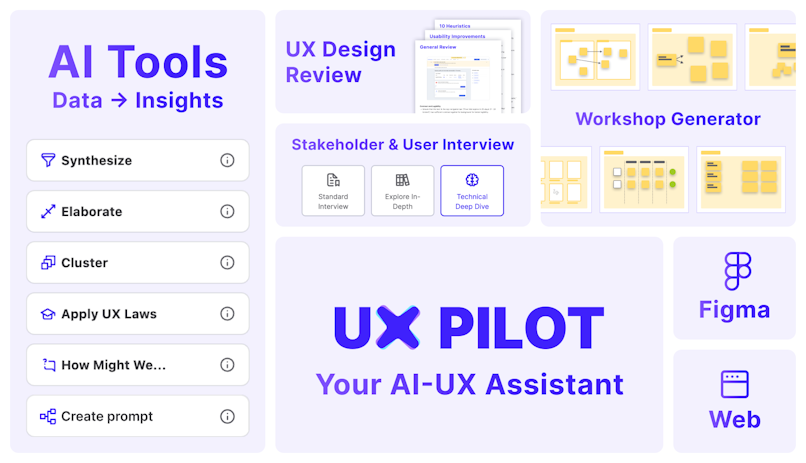
Key Features of UX Pilot
AI-UX Design Review: This feature sets UXPilot apart with its ability to use AI for in-depth design reviews, providing critical insights into user interface improvements and enhancing overall usability.
ChatGPT Integration in Figma: The integration of ChatGPT within Figma is a standout feature, enabling real-time AI-assisted collaboration and ideation directly in the design tool, a unique blend of AI technology with popular design software.
Custom Workshops: UXPilot’s capability to create tailor-made workshops based on AI insights allows design teams to address specific challenges effectively, fostering innovation and collaborative problem-solving.
Requirements Gathering and Analysis: The tool’s advanced approach to gathering and analyzing project requirements using AI ensures that designs align precisely with user needs and project objectives, enhancing the relevance and effectiveness of the final product.
Support From Requirements to Style Guide: UXPilot covers the full spectrum of the design process, from the initial stages of requirements gathering to the development of a detailed style guide, ensuring a cohesive and streamlined design journey.
These features underscore UXPilot’s unique position in the realm of UX design tools, marking it as a forward-thinking solution for designers and product managers seeking to leverage the power of AI in their workflows.
2. 01.AI (Beijing, China)
01.AI, a Beijing-based startup, has rapidly gained attention in the generative AI space with its ambitious growth and innovative approach. Founded by Lee Kai-fu, the former chief of Google China, the company has quickly scaled to a valuation of $1 billion, driven by its pioneering work in open-source large language models (LLM).
01.AI's standout achievement includes the Yi-34B model, the first Chinese LLM to dominate the Huggingface leaderboard, marking a significant milestone in the global AI community. With plans to raise $200 million in fresh capital, 01.AI is not just competing with industry giants but also carving its niche in the ever-evolving world of artificial intelligence.

Key details of 01.AI:
Founding and Leadership: Founded by Lee Kai-fu, ex-chief of Google China, 01.AI is based in Beijing.
Valuation and Growth: Recently reached a $1 billion valuation and is in the process of raising up to $200 million in new capital.
Innovative AI Models: Known for its Yi-34B model, a leading Chinese large language model that topped the Huggingface leaderboard.
Open-Source AI Focus: Committed to developing open-source AI solutions, positioning it uniquely in the AI industry.
Global Recognition: Gained rapid recognition in the AI community for its advancements in large language models.
01.AI's trajectory and achievements position it as a significant player in the generative AI startup ecosystem, demonstrating the potential to reshape the future of AI technology.
3. Midjourney (San Francisco, USA):
Midjourney, developed by the independent research lab Midjourney, Inc. based in San Francisco, is a generative AI program and service. It specializes in creating images from text-based prompts, akin to similar functionalities found in OpenAI's DALL-E and Stability AI's Stable Diffusion.
Midjourney is a text-to-image diffusion model that can generate hyper-realistic images from user prompts. While not focused exclusively on design, its capabilities extend to architectural renderings and imaginary project visualizations. Midjourney has even created convincing building plans and sections, blurring the lines between fantasy and reality.
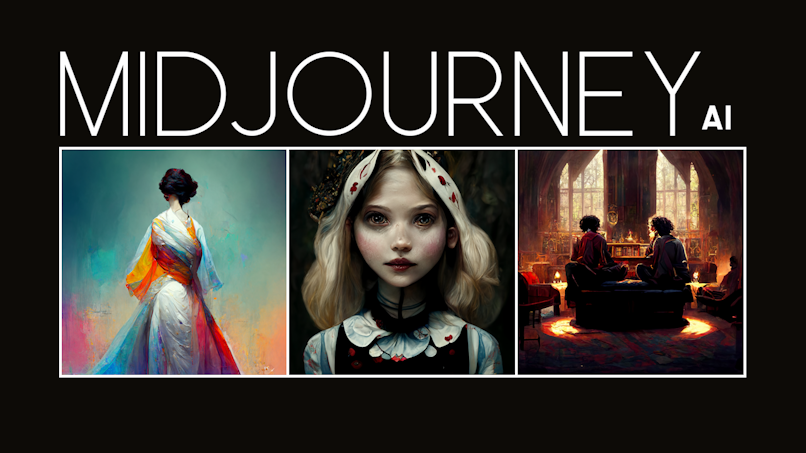
Key details of Midjourney:
Text-to-image diffusion model creating hyper-realistic art from user prompts.
Goes beyond static visuals, generating architectural renderings and building plans.
Offers different artistic styles and rendering options for customization.
Popular among artists, designers, and architects for its creative potential.
Featured in publications Worldwide.
4. 3DGuru (San Francisco, USA):
3DGuru was founded in 2022 by a team of experienced entrepreneurs with a passion for design and technology. The company is headquartered in Palo Alto, California, and has raised over $10 million in funding from prominent investors such as Andreessen Horowitz and Y Combinator.
Imagine an AI interior designer at your fingertips! 3DGuru is still in its pilot phase, but it promises to revolutionize home design with its chatbot interface. Provide a photo of your space, answer a few questions about your preferences, and let 3DGuru suggest floorplans, visualize potential designs, and recommend furniture and finishes.
With its talented team, strong financial backing, and commitment to innovation, 3DGuru is well-positioned to become a leader in the AI-powered interior design market.
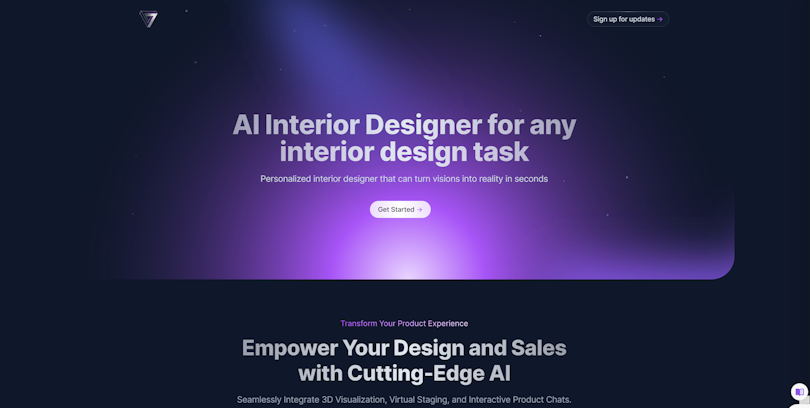
Key details of 3DGuru:
AI-powered interior design chatbot is still in the pilot phase.
Offers consultations through a user-friendly interface.
Generates floorplans, 3D visualizations, and furniture recommendations.
Aims to democratize access to professional interior design expertise.
Partnering with leading furniture and home goods brands for product integration.
5. Adobe Firefly (San Jose, USA):
Adobe's AI research lab is constantly pushing the boundaries of creative software. Firefly is a particularly exciting project that uses AI to suggest design layouts, fonts, and even color palettes based on your content and existing elements. Imagine the ultimate creative assistant, guiding you toward visually compelling designs with minimal effort.
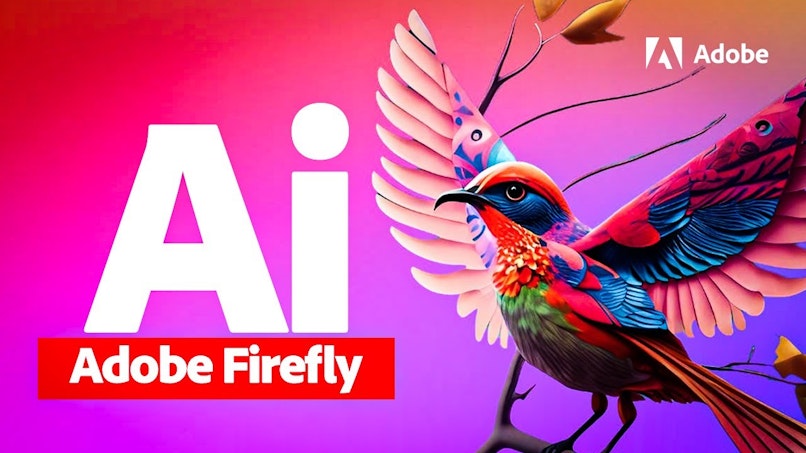
Key details of Adobe Firefly:
Adobe research lab project integrating AI into existing creative software.
Suggests layouts, fonts, and color palettes based on content and context.
Works seamlessly with Adobe Photoshop, Illustrator, and InDesign.
Aims to enhance creativity and reduce design time for professionals.
Expected to be integrated into future Adobe software releases.
6. RunwayML (San Francisco, USA):
RunwayML is an innovative startup at the forefront of creative technology, specializing in the intersection of artificial intelligence and art. Founded in 2018, RunwayML has developed a platform that empowers artists, designers, and creators to harness the potential of AI in their creative projects.
With a user-friendly interface and a wide range of AI models and tools, RunwayML democratizes AI-driven artistry, allowing users to generate, manipulate, and experiment with AI-generated content seamlessly. The startup's mission is to bridge the gap between technology and creativity, enabling individuals from various artistic backgrounds to explore new frontiers in art, design, and interactive media through AI-powered innovation.
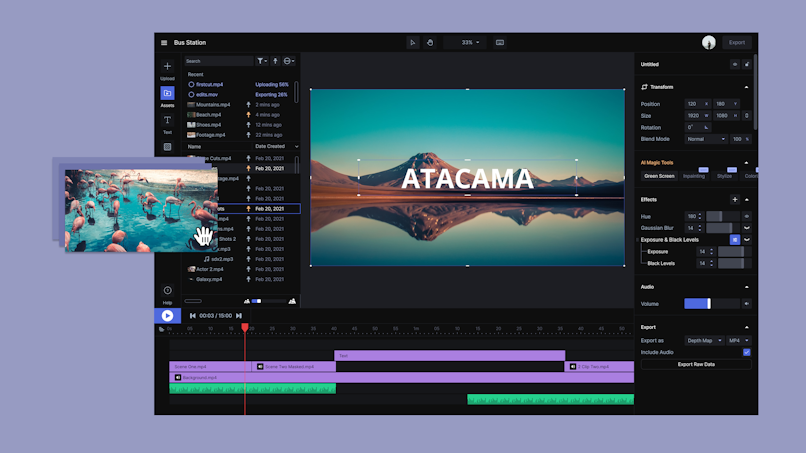
Key details of RunwayML:
Open-source platform offering a plethora of AI tools for creators.
Features video editing, image manipulation, music composition, and 3D modeling.
Provides pre-trained models and APIs for developers to build custom applications.
Empower users to experiment with AI and integrate it into their workflows.
Attracts a large community of artists, designers, and developers.
7. Dream by WOMBO (Vancouver, Canada):
WOMBO, a Canadian startup, has made waves in the world of AI-powered creative tools with its latest app called Dream. This innovative application allows users to transform text prompts into original artworks using artificial intelligence. The process is incredibly straightforward: users provide a textual description of what they want to be painted, select a style from various options, and hit create.
In a matter of seconds, the app generates a unique piece of art based on the input. What sets Wombo's Dream app apart is its lightning-fast production speed, with artworks materializing almost instantly. Users can even purchase prints of their creations through the app, potentially turning a 20-second processing time into a revenue stream. Dream has already generated over 10 million images since its launch, demonstrating its popularity.

Key Details of Wombo's Dream Startup:
AI-Generated Art: Wombo's Dream app uses AI to transform text prompts into original artworks, making it accessible to anyone who wants to create art with a simple description.
User-Friendly Interface: The app's interface is user-friendly, with quick and easy steps for generating art, making it suitable for both beginners and experienced artists.
Wide Range of Styles: Users can choose from various artistic styles, from Mystical to Steampunk, or opt for no style, providing flexibility in the creative process.
Rapid Production: Dream's standout feature is its lightning-fast image generation, taking only seconds to produce a finished artwork, showcasing the capabilities of modern AI.
Monetization: The app offers the option to purchase prints of generated artworks, potentially creating a revenue stream for the startup.
Popularity: Within a month of its launch, Dream had over 1 million downloads on Google Play and generated more than 10 million images, indicating its popularity among users.
8. Aleph Alpha (Heidelberg, Germany):
Aleph Alpha is a German AI research and application company founded in 2019, known for its work in developing and operating large-scale AI models for language, image data, and strategy. The company aims to empower businesses and governments with advanced generative AI technology to gain a competitive edge in the thriving AI economy. Aleph Alpha's proprietary research and technology are built on independent foundations, trained in five languages, and possess up to 300 billion parameters, allowing them to continuously innovate and stay ahead of the market.
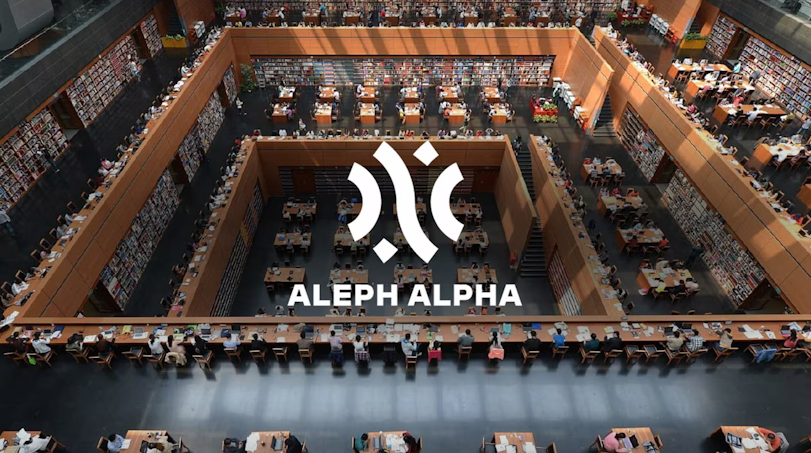
Key details about Aleph Alpha:
Mission: To empower businesses and governments with the most advanced generative AI technology to gain a decisive edge in the thriving AI economy.
Areas of focus: Language, image data, and strategy
Technology: Large-scale AI models with up to 300 billion parameters
Benefits: Elevates the potential of human experts, ensures compliance, fosters trustworthiness, and delivers unparalleled time-to-value
Target audience: Businesses, governments, and organizations across various industries
Business model: Subscription-based, with options for specific functionalities
Location: Heidelberg, Germany
Funding: Over half a billion US dollars from a consortium of industry leaders and new investors
9. PatternedAI (London, UK):
Patterned AI is a groundbreaking startup founded by Amr Mashlah. It is revolutionizing the pattern creation industry with its AI-powered technology. This innovative tool empowers users, ranging from designers and businesses to home décor enthusiasts, to effortlessly generate unique and seamless patterns for various surfaces, including textiles, wallpapers, and packaging.
Powered by deep learning algorithms, PatternedAI harnesses the power of artificial intelligence to analyze and generate patterns from a diverse range of inputs, including images, text, and even existing patterns. This intuitive and user-friendly platform eliminates the complexities of traditional pattern-creation methods, making it accessible to a wider audience.

Key details of PatternedAI:
Powered by deep learning algorithms: PatternedAI's cutting-edge technology leverages deep learning to analyze and generate patterns with remarkable accuracy and creativity.
Wide range of input options: Users can input patterns from images, text, or even existing patterns, opening up a world of creative possibilities.
Application across diverse surfaces: Patterns created with PatternedAI can be applied to various surfaces, including textiles, wallpapers, and packaging, showcasing the tool's versatility.
Accessibility for designers, businesses, and consumers: PatternedAI caters to a wide range of users, empowering designers to create unique patterns, businesses to establish brand identity, and consumers to personalize their home décor.
Competitive advantage: PatternedAI stands out from traditional pattern-creation methods by leveraging AI to generate seamless, personalized, and high-quality patterns.
Disruption to the pattern creation industry: PatternedAI has the potential to revolutionize the pattern creation industry, making it easier and more accessible for everyone to create stunning patterns.
10. LookX (Shenzhen, China):
LookX is a Shenzhen-based startup that is revolutionizing the architectural visualization industry with its AI-powered platform. The company's technology utilizes deep learning algorithms to create stunning 3D renderings of architectural projects, including buildings, interiors, and landscapes. Its capability involves turning a crumbled piece of paper into a fine 3D architectural masterpiece.
LookX was founded in 2019 by a team of experienced entrepreneurs with a passion for architecture and technology. The project has raised over $10 million in funding from prominent investors such as Sequoia Capital and ZhenFund. This funding will be used to continue developing the company's platform and expand its reach into new markets.
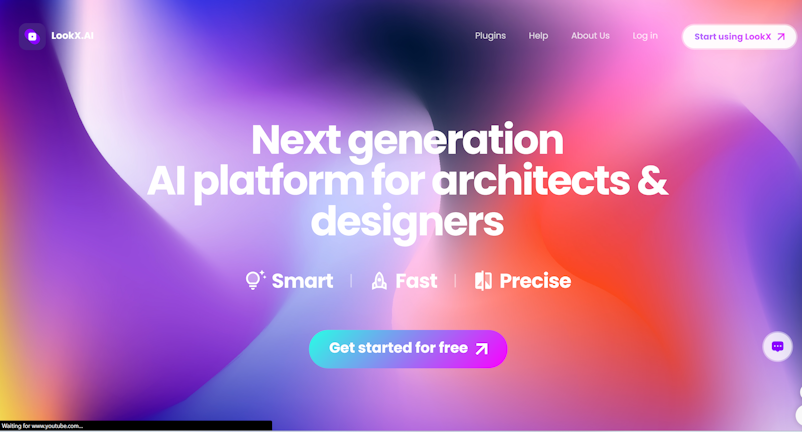
Key details of LookX:
Uses deep learning to generate stunning architectural visualizations in minutes.
Saves architects time and resources by eliminating manual rendering.
Integrates with BIM software for seamless workflow.
Boasts projects for global architecture firms like Zaha Hadid Architects.
Won the 2023 World Architecture Festival Future Award.
These ten startups represent just a fraction of the many innovative forces shaping the future of AI design. As technology continues to evolve, we can expect even more groundbreaking applications and tools to emerge, changing the way we design and interact with the world around us.
How These Startups are Changing the Game for UX Designers
In the world of UX design, these startups are akin to skilled chess players making strategic moves. Each tool and platform brings its unique strengths to the board, altering the game's dynamics. Automating repetitive tasks frees designers to focus on creativity and innovation. Their predictive analytics and collaborative capabilities enable more refined and user-centric designs, a transformation echoed in "Unleash Your Creativity With AI Tools for UX Design".
10 Predictions and Trends of Future AI Startups
The future of AI is bright, and at the epicenter of this brilliance are AI startups, pushing boundaries and transforming industries. Let's peek through the looking glass and explore some key predictions and trends shaping their landscape:
1. Democratization of AI: Forget elite labs and tech giants. AI tools and platforms will become increasingly accessible, empowering non-technical users to integrate AI into their work and lives. Think intuitive interfaces, pre-trained models, and drag-and-drop solutions for everyone from artists to farmers.
2. Hyper-specialization: Gone are the days of one-size-fits-all AI. Startups will focus on specific niches, honing their expertise in domains like medical diagnostics, climate forecasting, or personalized learning. This hyper-specialization will lead to deeper insights and more impactful solutions.
3. Ethical AI on the Rise: As AI's influence grows, concerns about bias, transparency, and privacy will take center stage. Startups addressing these concerns through explainable AI, responsible data sourcing, and inclusive design will thrive.
4. The Human-AI Collaboration: AI won't replace humans, it will augment them. We'll see a shift towards collaborative partnerships, where humans provide creativity and oversight, while AI handles repetitive tasks and data analysis. Think AI-powered writing assistants, design partners, and even legal research tools.
5. Edge AI Takes the Stage: Processing data at the source, not in the cloud, will become crucial for real-time applications like autonomous vehicles and smart cities. Edge AI startups developing efficient hardware and software for on-device computing will stand out.
6. AI for Sustainability: The fight against climate change will see AI playing a vital role. Startups optimizing renewable energy grids, predicting extreme weather events, and developing sustainable materials will be game-changers.
7. AI-powered Wellness Revolution: From mental health therapy to personalized nutrition plans, AI will revolutionize healthcare and wellness. Startups offering AI-powered diagnostics, preventative measures, and even virtual companions will shape healthier futures.
8. The Rise of Explainable AI: As AI decisions impact everything from loan approvals to criminal justice, trust will become paramount. Startups developing transparency tools that explain how AI algorithms arrive at their conclusions will be in high demand.
9. The AI Security Challenge: Mitigating AI security risks like hacking and manipulation will be critical. Startups developing robust security measures and ethical frameworks for AI development will become essential partners in a world increasingly reliant on AI.
10. The Creative Renaissance: AI will unleash a new wave of creative expression. Imagine AI-powered music composition, poetry generation, or even hyper-personalized stories. Startups at the forefront of this artistic fusion will redefine the limits of creativity.
The future of AI startups is not just about technology, it's about humanity. These trends highlight the incredible potential of AI to empower individuals, solve global challenges, and push the boundaries of what's possible. So, keep your eyes on these innovative forces, because they're not just shaping the future of technology, they're shaping the future of us all.
These trends are further detailed in "AI-Powered UX Research: Ultimate Guide To Future Trends".
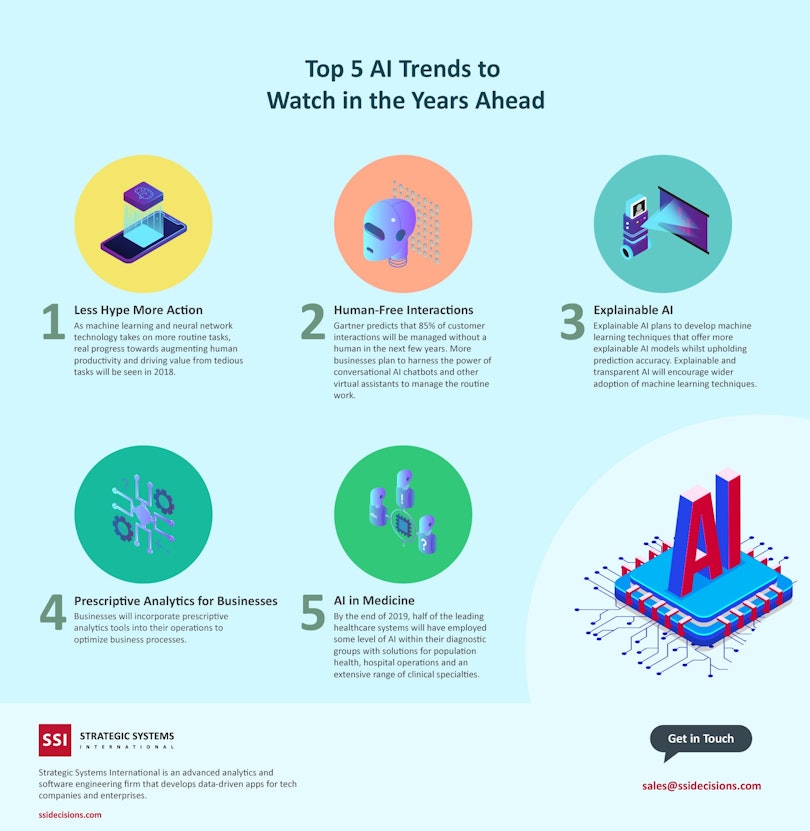
The Next Big Thing: Generative AI Startups
As we gaze into the future of design, generative AI startups stand at the forefront, heralding a new era. These startups are driving significant advancements in design. They leverage AI to create designs that are not only aesthetically pleasing but also deeply rooted in user data and behaviors. This rise of generative AI in design is a testament to the endless possibilities that AI brings to the table, offering designers tools that are more intuitive, adaptable, and innovative than ever before.
Conclusion
In conclusion, the fusion of AI and design is not just a trend; it's a transformative movement reshaping the UX design landscape. From Adobe Sensei's pattern recognition to UXPilot's comprehensive design journey facilitation, each AI design startup brings a unique blend of technology and creativity.
As we embrace these changes, the future of design looks promising, with AI serving as a catalyst for innovation and enhanced user experiences. The journey of design evolution continues, and as designers, we're at the helm of this exciting voyage, crafting experiences that are more human, yet technologically advanced. Let's embrace this new era with open arms and creative minds.



